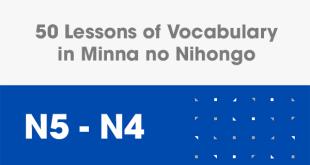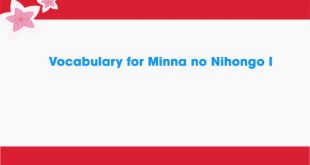Minna No Nihongo Lesson 21 Grammar
1. The regular verb +と + おもいます
Used to indicate judgment and judgment:
For example :
あした あめがふるとおもいます。
I think it will rain tomorrow
テラさちゃんはねるとおもいます。
I think Terasa is asleep
When judging a content with negative meaning, the preceding part [と] is negative
For example :
ミラーさんは このニュースをしっていますか?
Does Mr. Miller know this news?
いいえ、たぶん しらないとおもいます。
No, I think not.
Use to express opinions:
For example :
にほんはぶっかがたかいとおもいます。
I mean the prices in Japan are high
When you want to ask someone’s opinion about something, you should use the sentence form [~について どうおもいますか], don’t use [と] after [どう]
For example :
あたらしいくうこうについてどうおもいますか?
What do you think about the new airport?
きれいですが、ちょっと こうつうが ふべんだ とおもいます。
I mean beautiful but it’s a bit inconvenient to travel
To show you agree or disagree with others, use the following:
ファクスはべんりですね。
Fax is convenient, right!
わたしもそうおもいます。
I think so too!
わたしはそう「は」おもいません。
I do not think so!
2. 「the sentence」 / regular form + と + いいます
Quote directly
We put the whole quote into 「」
For example :
ねるまえに、「おやすみなさい」といいます。
Before going to sleep, we say Oyasuminasai
みらーさんは「らいしゅうとうきょうへしゅっちょうします」といいました。
Mr. Miller said that next week he will go on business in Tokyo
Indirect citation
Using the regular form before [と], the time of the quotation does not depend on the time of the sentence
For example :
みらーさんはらいしゅうとうきょうへしうっちょするといいました。
Mr. Miller said next week he will go on business in Tokyo
3. Regular verbs / adjectives / nouns + でしょう?
Meaning: ~ is it true / is it right?
How to use :
Use when expecting that the listener also knows or has an understanding of what he or she is saying and wants the listener to endorse his opinion.
でしょう is read in a voice like a question to confirm the agreement of the listener.
For example :
にちようびえいがをみにいくでしょう?
Do you go to the movies on Sundays?
ええ、いきます。
Yes, let’s go.
そのかばんはたかかったでしょう?
That bag must be very expensive, right?
いいえ、そんなにたかくなかったです。
No, not that expensive
やまだせんせいはしんせつでしょう?
Mr. Yamada is friendly, right?
ええ、とてもしんせつです。
Yes, very friendly
ハイさんはにほんごのせんせいでしょう。
Is Hai a Japanese teacher?
いいえ、えいごのせんせいです。
No, English teacher
4. Noun 1 (place) で Noun 2 があります
Meaning: In the noun 1 organized, place noun 2
Usage: When the noun 2 is an event such as a party, concert, festival, accident or disaster … then [あります] means to be held and take place.
For example :
こうべで おおきい じしん が ありました。
In Kobe, there was a large earthquake
あした、ゆきちゃんのうちでパーティーがあります。
Tomorrow, at Yuki’s house, there will be a party
5. The noun of events + で
Usage: Used to indicate the location, situation where something happens, takes place
For example :
かいぎしつでなにかいけんをいいましたか?
During the meeting, do you have any ideas?
6. The noun + でも + the verb
When we want to suggest or suggest something to others, we use the expression [でも] to indicate a symbolic thing in a group of objects of the same category.
For example :
ちょっとびーるでものみませんか?
Do you drink beer or something?
7. The verb form ない ないと。。。
The short form of [verb form ない + といけません], in which [いけません] is omitted.
This sentence has the same meaning as [verb form ない + なければなりません]
For example :
もう かえらないと。。。
I must go home
Related Post: Minna No Nihongo Lesson 21 Vocabulary
 Learn Japanese Free Learn Japanese Free
Learn Japanese Free Learn Japanese Free







